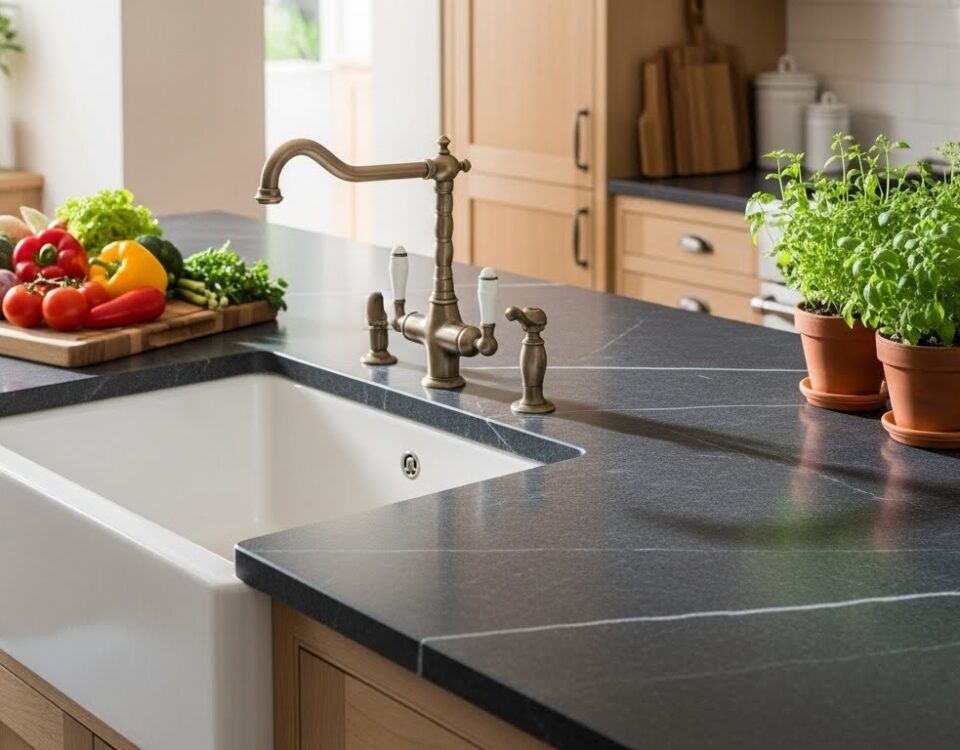The Timeless Charm of Backsplash Granite Slabs in Modern Kitchens
September 20, 2024DIY Installation of a Soapstone Kitchen Countertop: A Step-by-Step Guide
September 20, 2024Comparing Soapstone and Granite Kitchen Countertops: Which Is Better?
When evaluating soapstone versus granite for kitchen countertops, one must scrutinize the intrinsic properties and performance metrics of each material. Soapstone, composed primarily of talc, is renowned for its non-porous nature, which confers superior stain resistance and low maintenance requirements. Conversely, granite, an igneous rock rich in quartz and feldspar, offers unparalleled hardness and a vast spectrum of color variations, enhancing its aesthetic appeal and scratch resistance. The decision pivots on critical factors such as maintenance, thermal resilience, and cost-efficiency, each of which can significantly influence kitchen functionality and visual harmony.
Material Comparison
When comparing soapstone and granite kitchen countertops, understanding the intrinsic properties of each material is essential. Soapstone, primarily composed of talc, presents a unique, smooth texture and a matte finish. Its density makes it highly resistant to stains and bacteria, a desirable quality for those prioritizing hygiene. Additionally, soapstone’s thermal stability allows it to endure direct contact with hot pots without sustaining damage. However, its softness, a consequence of its talc content, renders it susceptible to scratches, though these can be easily sanded out.
In contrast, granite is an igneous rock composed mainly of quartz, feldspar, and mica, delivering a robust, crystalline structure. Renowned for its striking aesthetic, granite offers a high gloss finish and a diverse palette of colors and patterns. Its hardness, rated 6-7 on the Mohs scale, ensures exceptional scratch and heat resistance, making it a preferred choice for high-traffic kitchens. Moreover, granite’s porosity necessitates periodic sealing to prevent staining and bacterial infiltration, a crucial maintenance consideration.
Both materials cater to different functional and aesthetic preferences, and their inherent properties significantly influence their performance and longevity in kitchen environments. Understanding these nuances enables homeowners to make informed choices aligned with their lifestyle needs.
Making the Decision
Selecting the ideal countertop material for your kitchen involves a nuanced decision-making process that balances aesthetic appeal, functional requirements, and maintenance considerations. When deliberating between soapstone and granite, homeowners must weigh multiple factors to ensure the chosen material aligns with their lifestyle and design vision.
Key considerations include:
- Durability: Granite boasts superior hardness and resistance to scratches, making it a robust choice for high-traffic kitchens. Soapstone, while softer, offers a unique patina that develops over time, adding character.
- Maintenance: Soapstone requires periodic oiling to maintain its deep color, while granite necessitates regular sealing to prevent staining.
- Heat Resistance: Both materials exhibit excellent heat resistance, but soapstone can endure direct contact with hot cookware without risk of damage.
- Aesthetics: Granite offers a diverse range of colors and patterns, providing versatile design options. Soapstone, however, presents a more uniform, matte finish with subtle veining.
- Cost: Generally, soapstone tends to be more expensive upfront but may save costs in long-term maintenance compared to granite.
Ultimately, the decision hinges on personal preferences and specific kitchen needs. By thoroughly assessing these criteria, homeowners can confidently select a countertop material that harmonizes with their design goals and functional demands.
Read More:
DIY Installation of a Soapstone Kitchen Countertop: A Step-by-Step Guide


